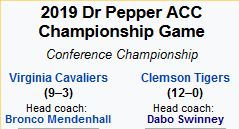Only
a weekend of conference championship games and the final machinations of the College
Football Playoff Committee separate us from knowing the participants and
seeding in this year’s playoff. The dye is mostly cast. Barring a couple of
monumental upsets, we know the possibilities for raising the trophy on January 13
at the Mercedes-Benz
Superdome in New Orleans.
LSU,
Ohio State, Clemson
The top three teams – LSU,
Ohio
State, and Clemson
– sent messages on the last weekend of the regular season. LSU
destroyed Texas A&M, 50-7, expressing its displeasure with the
committee for elevating Ohio
State to the number one spot in the rankings. Meanwhile, despite Michigan
Coach Jim
Harbaugh’s annoyance with post-game
questions about the gap between his
program and the Buckeyes, Ohio
State’s 56-27 thrashing of the Wolverines for its eighth
straight win in the series showed the
size of the gap, whatever the reasons. Clemson, which has been untouchable
since a one-point squeaker
September 28 over Mack
Brown’s now bowl eligible North
Carolina team, pounded
South Carolina, 38-3, despite calling off the dogs early in the fourth
quarter. Those three are virtually a lock.
Even
if Georgia
beats LSU in the SEC
championship
game at Mercedes-Benz Stadium in Atlanta (Saturday, 12/7, 3:30 ET, CBS),
the Bayou Bengals and their likely Heisman quarterback, Joe Burrow, have a spot.
Ohio State also
probably gets in, even with a stumble
against Wisconsin
in the Big 10 championship
game at Lucas Oil
Stadium in Indianapolis (Saturday, 12/7, 8:00 ET, Fox). The Buckeyes beat
Wisconsin, 38-7, on October 26, so why worry?
Clemson’s situation
differs a little. The defending champions and pre-season No. 1 have taken a lot
of grief for that close call at North Carolina and for a seemingly weak overall
schedule. They face an ordinary opponent in an unranked, 9-3 Virginia
team
in the ACC
championship game at Bank
of America Stadium in Charlotte (Saturday, 12/7, 7:30 ET, ABC). Losing
probably would kick Clemson out of the playoff, but that’s a very unlikely
eventuality (full disclosure: Rob’s daughter is a former Clemson athlete and he
is a Clemson season ticket holder).
No.
4
The most impactful development the last
weekend of the regular season was Auburn’s
48-45 win over Alabama in the Iron
Bowl, putting the Crimson
Tide out of its misery as to the playoff. Alabama’s loss to LSU left Nick
Saban’s team ranked number five and generated much speculation about whether
it should get in if one of the top four lost, especially after a hip injury
sidelined starting quarterback Tua
Tagovailoa. Now, none of that matters.
But who gets the fourth
spot, assuming LSU, Ohio State, and Clemson claim the first three? Georgia, Utah, and Oklahoma
seem best positioned, with Baylor
grasping at straws.
Only
Georgia controls its destiny. If the Bulldogs upset LSU in the SEC championship
game, Kirby
Smart’s talented, if inconsistent, squad
gets in (Georgia lost to that South Carolina team Clemson throttled so easily).
But, Georgia has problems, because of injuries and undisciplined play in its
52-7 beat down
of rival Georgia Tech on the last weekend of the regular season.
Receiver George
Pickens was ejected for throwing a punch and faces suspension for the first
half of the LSU game. Georgia’s already missing leading receiver Lawrence
Cager. The status of running back D’Andre
Swift remains uncertain.
Should Georgia lose,
Utah has the best chance of stepping in, assuming the once-
beaten Utes handle
Oregon in the Pac
12 championship game at Levi’s Stadium in
Santa Clara, California (Friday, 12/6, 8:00 ET, ABC). But for a late season
loss to Arizona
State, the Ducks
could have been in the picture too. Utah has a dynamic, dual threat quarterback
in Floridian Tyler
Huntley and could give one of the top 3 a tussle, despite the fact most of
country knows little about the Utes.
Oklahoma
should be undefeated. The Sooners
and quarterback Jalen
Hurts, who transferred from Alabama, however, saddled themselves with a 48-41
loss to Kansas State
on October 26. The result? Oklahoma needs a second win
over Baylor
in the Big 12
championship game at AT&T
Stadium in Dallas (Saturday, 12/7, 12:00 ET, ABC).The once-beaten Bears had
Oklahoma down,28-3 with 11:02 left in the second quarter on November 16,
but lost, 34-31. Baylor ranked ninth in
the committee ratings going into the last weekend of the regular season, so
everything would have to break perfectly for a hop into the fourth spot, even
with a win over Oklahoma.
The
Future
Each
year’s playoff scramble conjures up thedebate on how many teams the playoff
should include. Many want an eight-team
playoff, something leaders of the sport
say they may look at when the present television contract expires after the 2025
season.
Last year, we suggested an eight-team
format giving each champion in the Power Five
conferences – ACC, SEC, Big 10, Big 12, and Pac 12 – an automatic spot,
with three at large selections, reserving a preference for a “deserving” Group
of Five (leagues like the American
Athletic Conference, Sun
Belt, Conference
USA) team. Nothing we’ve seen this year dissuades us from that idea. We
still see this as better than the old Bowl
Championship Series (BCS) or, heaven forbid, the so-called Mythical
Championship when nothing got settled on the field. What we have isn’t
perfect, but it’s sure better than that.



























